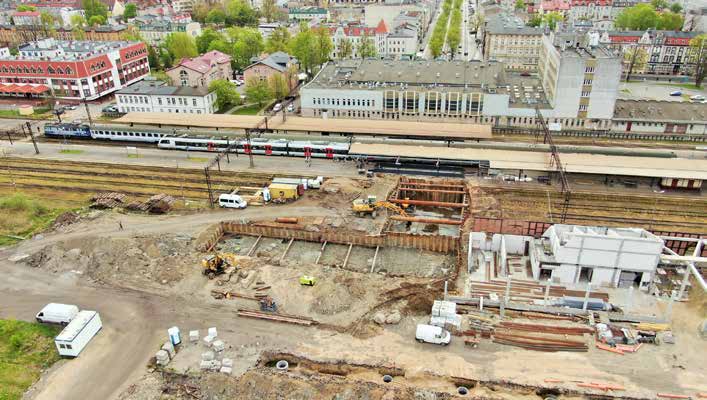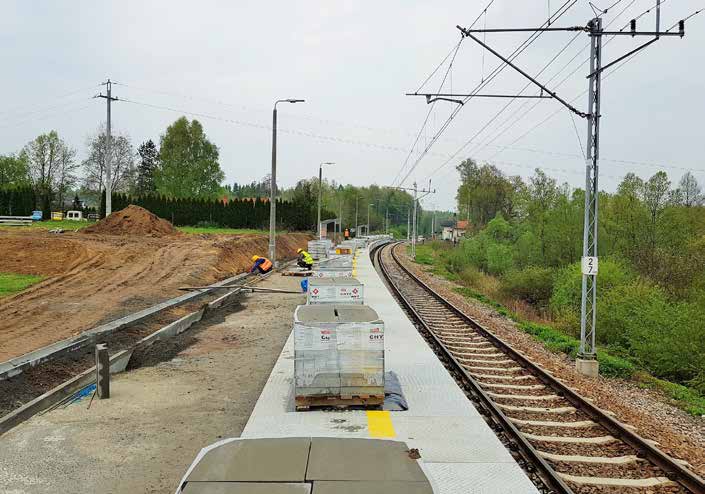Poland’s new directions are shaped around European policies on tackling climate change and sustainable development, yet not to a great detriment caused by rapid change but, on the contrary, by a slow but steady transition with a firm impact to boost the economy. Of course, it is essential that the proposed programmes and projects aim to reduce emissions, and rail transport has a prominent place here. Since the commitment of the authorities to allocate investments in railways and the high level of absorption of European funds, Poland has not ceased to launch new initiatives to develop rail transport through the implementation of infrastructure projects.
With the new project, Kolej Plus, the rail network will become complete due to the fact that small towns, which have no access or limited access to rail transport services will benefit from
connections. High frequency services will be thus provided between small towns and large regional cities, i.e. voivodeship capitals, and further to the national network.
by Pamela Luica
Since 2019, Poland has aligned its national development strategy, as well as strategies at the level of ministries, with the new European guidelines based on climate change and proposing projects that contribute to sustainable development.
As an EU member state, Poland has approved National Energy and Climate Plans (NECPs) for the period 2020- 2030. Poland’s energy sector focuses on coal and is the largest greenhouse gas emitter with a share of around 38% of total emissions. In 2020, coal accounted for 41% of the country’s total energy supply and 59% of energy-related CO2 emissions. Also in 2020, 69% of Poland’s electricity came from coal. While emissions from the energy industry decreased by 17% between 2005 and 2019, emissions from transport increased by 84% to a share of 17% in 2019.
Poland has also reached a 12.2% share of renewable energy resources (in 2019) and by 2030 it plans to increase this to 23%, focusing on biofuels, biomass, and wind energy. Poland’s energy policy for 2040, approved in 2021, sets a share of at least 23% of renewable energy (RES) (ENG:RES- Renewable energy share) by 2030, and for electricity generation, RES should have a share of over 32%, while the coal share should not exceed 56%. With all the targets set, the European Commission assessed the 2030 target as a modest ambition for primary and final energy but acknowledged the authorities’ efforts to transform this sector compared to the 2020 target.
It should be noted, however, that Poland is the most coal dependent of all EU countries, and the transition to a low-carbon economy implies a massive restructuring of the energy sector, especially coal mining. At COP24 in Katowice, the Government stated that a transition from coal dependence is needed, and that in 2021 it was agreed (with the miners’ unions) to phase out coal mining and close the last coal mine in 2049. To ensure electricity supply, the authorities plan to build six nuclear power plants, with the aim of the first becoming operational from 2033 and building such plants every two to three years. We feel it is necessary to mention these matters since the energy plan also includes the transport sector, whose level of emissions increased by 84% between 2005 and 2019. To this end, the country’s plans are based on allocating investment in infrastructure for liquefied natural gas (LNG), electrification and shifting traffic to low-emission modes of transport and encouraging public transport. Thus, the sustainable transport strategy foresees a reduction in CO2 emissions from passenger cars and commercial vehicles by 15% by 2025 (compared to 2021 levels) and to achieve a 37.5% reduction for new passenger cars and a 31% reduction for new commercial vehicles by 2030.
Read the full article in Railway PRO Magazine – June edition
Decarbonising transport is an important step towards building a sustainable transport system and achieving sustainability targets not only at national but also at European level. Therefore, to achieve its goals, Poland intends to support low-carbon transport through the development of alternative fuels, primary electricity as well as the LNG and compressed natural gas (CNG) segment, leading to overcoming dependence on oil imports and limiting the negative environmental impact of transport. Electromobility is another alternative to the development of the transport system and is a flagship programme for introducing innovative solutions in this sector that address both energy and transport, for which the Government has engaged energy, transport, and other private sector players to bring this initiative to fruition. By 2025, the programme sets out to purchase more than 1 million electric vehicles nationwide and increase the number of LNG and CNGpowered vehicles, for which relevant infrastructure will also be available.
The transport sector should have a 14% share of renewable energy by 2030 and hand in hand with the development of sustainable transport it is intended to increase its efficiency by promoting environmentally friendly modes such as rail and intermodal transport in order to build an integrated, developed and efficient transport system that meets mobility requirements.
Sustainable transport strategy
The 2030 Sustainable Transport Strategy aims to strengthen the railways as part of an integrated national and international transport system. To this end, it is necessary to continue the modernisation and expansion of the network and services in order to have a positive influence on the competitiveness of this mode of transport with other modes in terms of travel times, costs, safety and comfort. These considerations will be achieved through investment in new technologies, including ERTMS deployment and projects and programmes that will ensure the process of gradual integration of network interoperability with that of the European railway system.
Underpinning this are projects to modernise, expand and revitalise rail connections, including the implementation of the ambitious CPK (Solidarity Transport Hub Poland) project – which will integrate road, rail and air transport between Warsaw and Lodz, with a focus on rail transport.
Read the full article in Railway PRO Magazine – June edition
Share on:





